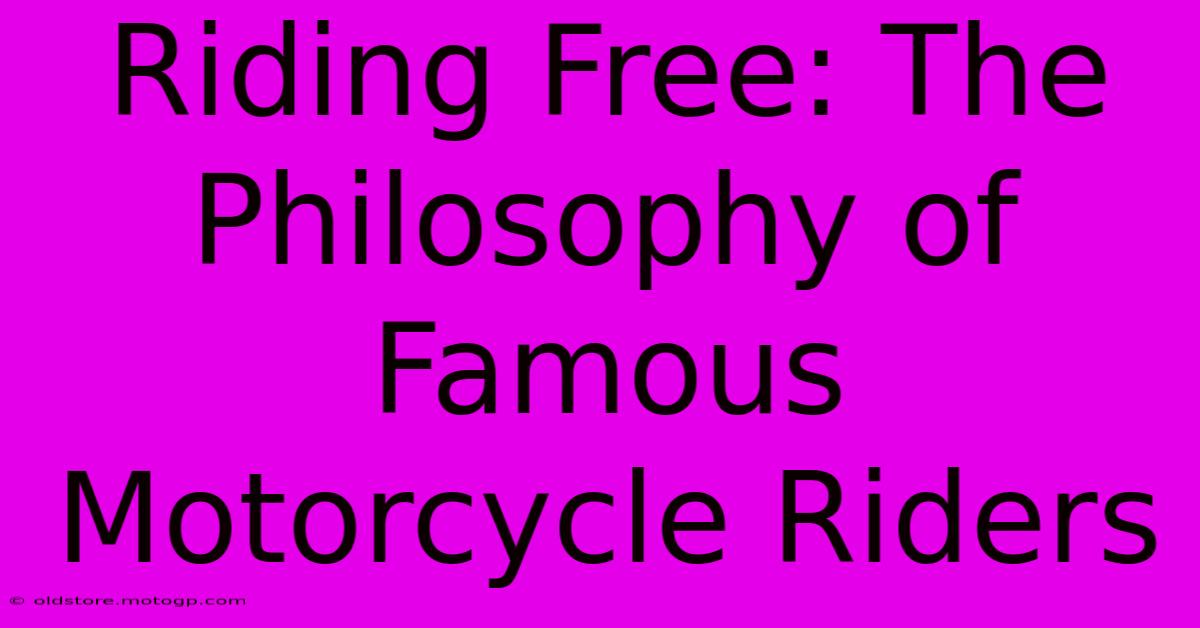Riding Free: The Philosophy Of Famous Motorcycle Riders

Table of Contents
Riding Free: The Philosophy of Famous Motorcycle Riders
The open road. The wind in your hair. The rumble of the engine beneath you. For many, motorcycling is more than just a mode of transportation; it's a philosophy, a way of life. This article explores the philosophies of some famous motorcycle riders, delving into what their experiences on two wheels have taught them about life, freedom, and the journey itself.
The Rebellious Spirit: Marlon Brando and Peter Fonda
Marlon Brando, in his iconic role in "The Wild One," embodied the rebellious spirit of motorcycle culture. His character, Johnny Strabler, wasn't just a biker; he represented a generation questioning authority and embracing nonconformity. While Brando himself wasn't a fervent motorcyclist in real life, his portrayal cemented the motorcycle as a symbol of rebellion and freedom in popular culture. This rebellious streak, the rejection of societal norms, continues to resonate with many riders today.
Peter Fonda, in "Easy Rider," took this rebellious spirit a step further. His character, Wyatt, along with Billy (Dennis Hopper), embarked on a transformative journey across America, encountering both the beauty and the harsh realities of the counterculture movement. The film, though fictional, tapped into a deep-seated desire for freedom and self-discovery, a yearning that many associate with the open road and the motorcycle. Their journey wasn't just about the destination; it was about the unpredictable, liberating experience of the ride itself.
Escaping the Everyday: The Importance of the Journey
Both Brando's and Fonda's portrayals emphasize a crucial element of motorcycle philosophy: the importance of the journey over the destination. The open road offers a chance to escape the confines of everyday life, to shed societal expectations, and to confront oneself in a raw, unfiltered way. The motorcycle becomes a vehicle for introspection, a catalyst for self-discovery.
The Zen of Riding: Finding Peace on Two Wheels
For many riders, motorcycling is a form of meditation. The focus required to control the machine, the awareness of the surroundings, and the rhythm of the road can induce a state of mindfulness. This Zen-like approach to riding connects the rider with the present moment, allowing them to appreciate the beauty of the landscape and the simple act of being alive.
This philosophy transcends mere transportation; it becomes a spiritual practice. The act of riding can clear the mind, reduce stress, and foster a deeper connection with oneself and the natural world. This sense of peace and tranquility is a powerful draw for many riders, providing a welcome escape from the chaos of modern life.
The Thrill and the Risk: Embracing the Unknown
Motorcycling isn't without its risks. The inherent dangers of riding demand respect, responsibility, and a healthy dose of courage. This acceptance of risk, however, can be empowering. It forces the rider to confront their fears, to push their limits, and to live fully in the present moment. The thrill of the ride, the adrenaline rush, and the constant challenge all contribute to the allure of motorcycling for many.
The Community: Finding Brotherhood and Sisterhood on the Road
Beyond the individual experience, motorcycling fosters a strong sense of community. Motorcycle clubs and riding groups provide a sense of belonging, shared experiences, and mutual support. This brotherhood (and sisterhood) transcends geographical boundaries and social differences, uniting individuals through their shared passion for riding.
The camaraderie and mutual respect among riders create a supportive environment where riders can share their experiences, learn from each other, and enjoy the thrill of the ride together. This sense of community is a vital part of the motorcycle culture, adding another layer to the philosophy of riding free.
Conclusion: The Enduring Appeal of Riding Free
The philosophy of famous motorcycle riders, whether portrayed on screen or lived in reality, encapsulates a yearning for freedom, self-discovery, and a connection with the natural world. It's a philosophy that transcends generations and continues to resonate with riders today. The open road, the rumble of the engine, and the wind in your hair—these are more than just sensations; they are symbols of a life lived fully, authentically, and free. The journey, the community, the thrill, and the peace—these are the elements that make riding free a timeless and enduring pursuit.

Thank you for visiting our website wich cover about Riding Free: The Philosophy Of Famous Motorcycle Riders. We hope the information provided has been useful to you. Feel free to contact us if you have any questions or need further assistance. See you next time and dont miss to bookmark.
Featured Posts
-
Cota Transportation Options You Need To Know
Feb 23, 2025
-
Experience The Adrenaline Rush Of Moto 3 Racing
Feb 23, 2025
-
Parking Near Cota This Austin Map Is Key
Feb 23, 2025
-
Moto Gp Sprint Race Results A Recap Of The Intense Action
Feb 23, 2025
-
Cota Parking Lot Map The Essential Guide For Race Fans
Feb 23, 2025
